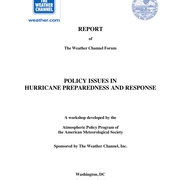Download Report
EXECUTIVE SUMMARY
The Forum on Policy Issues in Hurricane Preparedness and Response brought together experts and representatives from the emergency management, media, and meteorological science and services communities to address the following central question:
What policy changes are needed to produce weather services, media communications, and emergency management decisions that will optimize hurricane preparedness and response?
Today’s hurricane warning and response system is more capable than ever before, but it is inadequate to avert a major catastrophe with its attendant large loss of life, enormous property destruction and business disruption, and long recovery times. One of every five people in the United States is at direct risk of hurricane impact, and the number is growing daily. During the last decade or two we have been very fortunate. Considering the large increases in population and development in hurricane prone areas, storms of great magnitude similar to those experienced in the past, striking the same regions now, would cause much greater losses in life and property.
As more people migrate to the coasts and concentrate in urban areas, the pace of growth in evacuation clearance times is outstripping advances in forecast skill. Populations are often asked to evacuate days before anticipated landfall, when the storm’s future location and intensity are still very uncertain. For example, New Orleans requires 72 hours to evacuate. Business-as-usual approaches such as incremental improvements in prediction skill and modifications in present evacuation procedures must be augmented by substantial advances in hurricane preparedness, forecasting, and response strategies, and by more effective coordination. To substantially reduce future hurricane losses will require concerted action on the part of all levels of government, as well as private enterprise and the general public.
The Forum developed seven principal findings:
1. Hurricane preparedness and response rely primarily on weather prediction and evacuation.
The nation’s hurricane policy has evolved so that it places only minimal reliance on land use strategies, structural engineering, and building codes.
2. Present hurricane response strategies are increasingly strained.
- Reliance on weather prediction and evacuation is increasingly strained by several factors:
- Population and economic development are growing dramatically in coastal areas.
- Forecasts of hurricane track and intensity are only slowly improving.
- Many evacuation clearance times now exceed the lead-time of high-confidence hurricane warnings.
- Many people remain in high-risk areas while the road and shelter infrastructure becomes overloaded with people at much lower risk.
3. The strains are forcing new hurricane response strategies.
Shelter-in-place or refuge-of-last-resort solutions are being considered to help meet hurricane threats. These solutions reduce response times but carry higher risk and less assurance of survival.
4. There are major opportunities to improve hurricane response strategies.
Opportunities exist in technology and science, government services and legislation, engineering and building, land use and planning, emergency management, communications, and education.
5. There is poor understanding and application of uncertainties in hurricane forecasts, risk assessments, population responses, infrastructure capacities, and media coverage.
Hurricane track and intensity predictions remain highly uncertain. Emergency management uncertainties include numbers of people receiving and reacting to response decisions, numbers of individuals with special needs, and infrastructure evacuation capabilities. Media uncertainties involve reporting accuracy, possible conflict between official and private forecasts, and the size of the audience for hurricane information. Inadequate appreciation for these uncertainties and poor communication of their implications result in large areas of watches and warnings, conflicting official guidance, public confusion, and ultimately, inappropriate response.
6. Policy changes could improve hurricane response in the near term.
Policies to improve hurricane response have been discussed over the past decade but for a variety of reasons have not been implemented.
7. Overall, the nation pays insufficient attention to hurricane preparedness and response.
In particular, there is a lack of attention, dialogue, and planning among the affected parties and insufficient investments to develop and implement response strategies.
The forum made five general recommendations:
1. Congress should mandate a “National Assessment of Hurricane Preparedness and Response”.
The Assessment should involve all levels of government; the affected economic sectors; the academic, research, and education communities; and the media. The Assessment should evaluate the status of the existing infrastructure and services to meet hurricane threats and propose specific mitigation policies and actions.
2. The Federal Emergency Management Agency (FEMA) should lead an effort, with its partner agencies, to strengthen the present system to a year-round, closely-coordinated hurricane response system encompassing national, regional, and local public and private agencies.
Current collaboration among the media, emergency management, and weather prediction communities should be strengthened to provide greater year-round coordination of responsibilities and cooperation among the parties encompassing all levels of government -- local, regional, and national.
3. Future development of the hurricane preparedness, forecast, communications and response system must address the full range of uncertainties.
The uncertainties outlined in Finding 5 should be clearly taken into account in the response system.
4. Government agencies should implement policies to strengthen existing hurricane programs and response procedures.
Specifically, prediction services should use the U.S. Weather Research Program (USWRP) to accelerate research efforts on hurricane prediction and the transfer of research results rapidly into operational forecast applications.
For the provision of emergency management services, institute policies that motivate individuals and local communities to become better-prepared and foster programs and cooperative activities with the media and private sector to communicate hurricane preparedness and response strategies.
To communicate weather emergency information more effectively, seek guidance from communications experts, professional broadcast meteorologists, qualified private meteorologists, and professional meteorological associations.
5. Congress should develop legislation to ensure funding for hurricane research, prediction, mitigation and response.
The legislation, as a matter of urgency, should provide long-term, continuous funding, above the current budget levels, for hurricane research and for improved prediction services, communications, mitigation programs and response capability.
Elaboration of these general findings and recommendations is given in Section II of the Report, and further specific recommendations are given in Section III on forecast considerations, Section IV on media issues, and Section V on response strategies.
